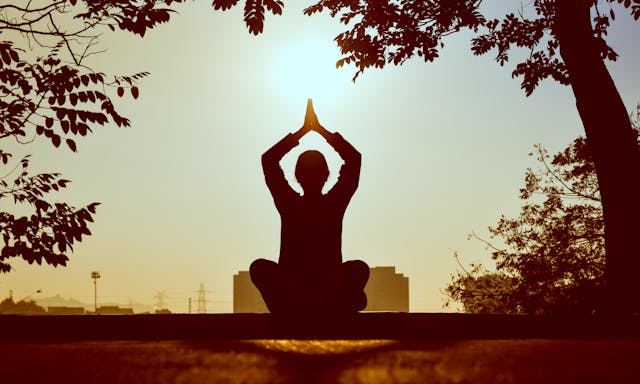In today’s world, where distractions are constant and stress seems to be a permanent companion, the practice of meditation offers a timeless refuge. Meditation, a practice rooted in ancient traditions, encourages us to slow down, breathe, and truly live in the present moment. This simple yet profound shift in focus can have transformative effects on both our mental and physical well-being.
Meditation has a rich history that dates back thousands of years, with its origins often traced to the ancient civilizations of India and China. It was first practiced by Hindu sages and later became central to Buddhist traditions, where it was used as a path to enlightenment. Over time, meditation spread across the world, finding its place in various cultures and religions. Today, it’s practiced not only in spiritual contexts but also as a powerful tool for personal growth and stress relief.

One of the key benefits of meditation is its ability to reduce anxiety and stress. By focusing on the present moment, meditation helps to quiet the mind, breaking the cycle of worry that often fuels anxiety. Research has shown that regular meditation can lower levels of cortisol, the stress hormone, which in turn reduces the physical symptoms of stress, such as high blood pressure and heart rate. The practice also encourages deep, conscious breathing, which further calms the nervous system and promotes relaxation.
Living in the moment, a concept at the heart of meditation, teaches us to appreciate the here and now rather than constantly dwelling on the past or worrying about the future. This mindful approach can lead to a greater sense of contentment and fulfillment, as we learn to find joy in simple, everyday experiences. The connection between mindfulness and mental health is well-documented; studies have shown that mindfulness practices, including meditation, can significantly reduce symptoms of depression, anxiety, and even chronic pain.

Physical health also benefits from regular meditation. In addition to lowering stress levels, meditation has been linked to improved sleep, better digestion, and enhanced immune function. The relaxation response triggered by meditation can help to reduce inflammation in the body, which is associated with numerous chronic conditions, such as heart disease and arthritis. Moreover, the mental clarity and focus gained from meditation can lead to healthier lifestyle choices, such as improved diet and exercise habits.
Bringing meditation into your daily life doesn’t require a complete lifestyle overhaul. It can be as simple as setting aside a few minutes each day to sit quietly and focus on your breath. Whether you choose to meditate in the morning to start your day with clarity or in the evening to unwind, the key is consistency. Over time, you’ll find that even a short meditation practice can create a profound sense of peace and balance.

Your surroundings can greatly enhance the meditative experience. Nature, with its calming sights and sounds, provides an ideal backdrop for meditation. Whether you’re sitting under a tree, listening to the rustling leaves, or meditating by the ocean, with the rhythm of the waves as your guide, connecting with nature can deepen your sense of mindfulness. This connection also fosters a greater appreciation for the natural world, reminding us of our place within the larger tapestry of life.
Many famous figures have turned to meditation as a source of strength and inspiration. Steve Jobs, the visionary co-founder of Apple, was known for his daily meditation practice, which he credited with helping him maintain focus and creativity in his work. The Beatles, particularly George Harrison, were instrumental in popularizing Transcendental Meditation in the West, a practice that continues to influence millions of people around the world. Even Oprah Winfrey, one of the most influential figures in modern media, has spoken about the benefits of meditation, incorporating it into her daily routine as a way to stay grounded amidst her busy life.

Meditation, at its core, is about reconnecting with ourselves and the world around us. It reminds us of the simple truth that life is unfolding in this very moment, and by embracing it fully, we can find greater peace and happiness. As we cultivate this awareness, we also nurture our relationship with nature, recognizing it as a source of wisdom and healing.
So, why not give meditation a try? Start with just a few minutes each day and gradually build your practice. You don’t need any special equipment or training—just a willingness to be still and present. Over time, you’ll likely discover that meditation is not just a practice, but a way of life that brings profound benefits to your mind, body, and spirit.
Here’s a guide on how to meditate and the skills that can help:
1. Find a Quiet Space
- Location: Choose a place where you won’t be disturbed. It could be a corner of your room, a garden, or any space that feels peaceful to you.
- Comfort: Sit comfortably on a chair, cushion, or floor. Keep your back straight to help with breathing and focus.
2. Settle into a Comfortable Position
- Posture: You can sit cross-legged, on your knees, or in a chair with your feet flat on the ground. Rest your hands on your knees or in your lap.
- Relax: Relax your shoulders and close your eyes. You can also keep them half-open, softly focused on a spot in front of you.
3. Focus on Your Breath
- Breathing: Inhale deeply and exhale slowly. Pay attention to the sensation of your breath entering and leaving your body.
- Awareness: Notice how your breath feels in your nostrils, chest, and abdomen. This focus helps anchor your mind.
4. Observe Your Thoughts
- Mindfulness: As you meditate, thoughts will arise. Rather than trying to suppress them, observe them without judgment, and let them pass like clouds in the sky.
- Return to Focus: If you get caught up in a thought, gently bring your attention back to your breath.
5. Cultivate Patience
- Time: Start with just a few minutes of meditation and gradually increase the time as you become more comfortable.
- Acceptance: Be patient with yourself. Meditation is a skill that develops over time, and it’s normal for your mind to wander.
6. End Your Session Gently
- Return: Slowly bring your awareness back to your surroundings. Take a few deep breaths and gradually open your eyes.
- Reflection: Take a moment to notice how you feel. Even if it was challenging, acknowledge your effort.
Skills That Enhance Meditation:
- Focus and Concentration
- Practice: Regular meditation enhances your ability to focus, which in turn makes meditation more effective. Start with short sessions to build concentration.
- Patience and Persistence
- Gradual Progress: Meditation is not about immediate results. Being patient and persistent will help you build a sustainable practice.
- Mindfulness and Self-Awareness
- Observation: Being mindful means being aware of your thoughts, emotions, and sensations without reacting to them. This skill deepens with practice.
- Compassion and Non-Judgment
- Acceptance: Developing compassion towards yourself during meditation helps in dealing with distractions and self-criticism. It allows you to meditate with an open heart.
Types of Meditation to Explore:
- Mindfulness Meditation: Focuses on being present and aware of your thoughts, feelings, and environment.
- Loving-Kindness Meditation (Metta): Involves directing feelings of love and compassion towards yourself and others.
- Body Scan Meditation: Focuses on different parts of your body to release tension and enhance relaxation.
- Guided Meditation: Involves following a guided narrative or instructions, often available in apps or recordings.
Love Life x
References:
- Kabat-Zinn, J. (2003). Mindfulness-Based Interventions in Context: Past, Present, and Future. Clinical Psychology: Science and Practice.
- Shapiro, S. L., & Carlson, L. E. (2009). The Art and Science of Mindfulness: Integrating Mindfulness into Psychology and the Helping Professions. American Psychological Association.
- Young, S. (2017). The Science of Enlightenment: How Meditation Works. Sounds True.
- Brown, K. W., & Ryan, R. M. (2003). The Benefits of Being Present: Mindfulness and Its Role in Psychological Well-being. Journal of Personality and Social Psychology.

